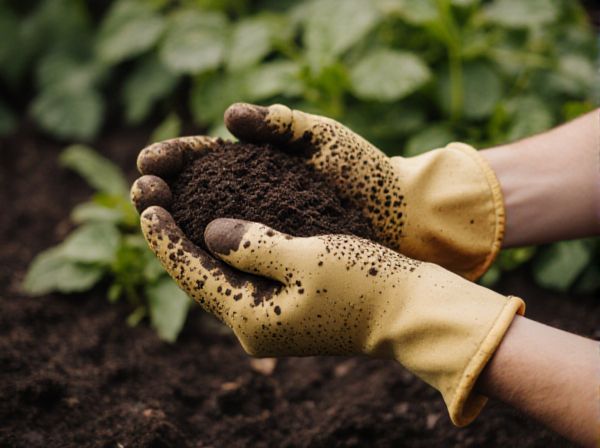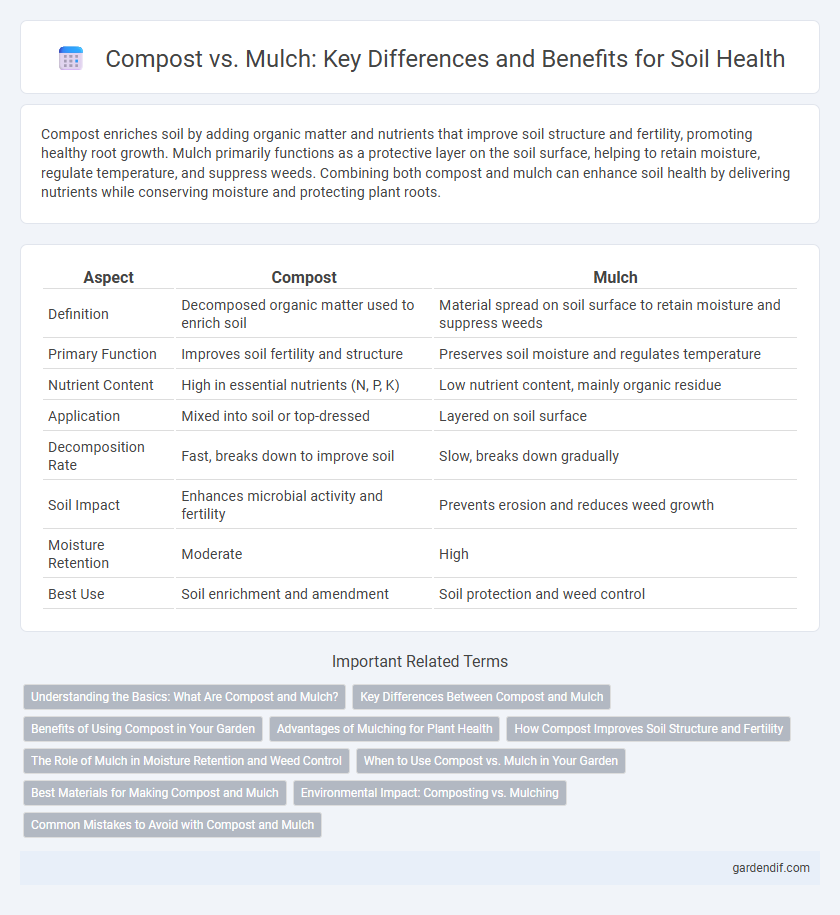
Compost vs Mulch Illustration
Compost enriches soil by adding organic matter and nutrients that improve soil structure and fertility, promoting healthy root growth. Mulch primarily functions as a protective layer on the soil surface, helping to retain moisture, regulate temperature, and suppress weeds. Combining both compost and mulch can enhance soil health by delivering nutrients while conserving moisture and protecting plant roots.
Table of Comparison
| Aspect | Compost | Mulch |
|---|---|---|
| Definition | Decomposed organic matter used to enrich soil | Material spread on soil surface to retain moisture and suppress weeds |
| Primary Function | Improves soil fertility and structure | Preserves soil moisture and regulates temperature |
| Nutrient Content | High in essential nutrients (N, P, K) | Low nutrient content, mainly organic residue |
| Application | Mixed into soil or top-dressed | Layered on soil surface |
| Decomposition Rate | Fast, breaks down to improve soil | Slow, breaks down gradually |
| Soil Impact | Enhances microbial activity and fertility | Prevents erosion and reduces weed growth |
| Moisture Retention | Moderate | High |
| Best Use | Soil enrichment and amendment | Soil protection and weed control |
Understanding the Basics: What Are Compost and Mulch?
Compost is decomposed organic matter rich in nutrients that enhances soil fertility and structure, promoting healthy plant growth. Mulch consists of organic or inorganic materials spread over soil surfaces to retain moisture, regulate temperature, and suppress weeds. Both compost and mulch play crucial roles in sustainable gardening by improving soil health and conserving resources.
Key Differences Between Compost and Mulch
Compost is a nutrient-rich organic material created through the decomposition of food scraps and yard waste, enhancing soil fertility and microbial activity. Mulch consists of organic or inorganic materials spread on the soil surface to conserve moisture, regulate temperature, and suppress weeds without significantly improving soil nutrients. The primary difference lies in compost's role as a soil amendment enriching soil structure and fertility, while mulch primarily serves as a protective layer for soil health and moisture retention.
Benefits of Using Compost in Your Garden
Compost enriches soil by improving its structure, moisture retention, and nutrient content, promoting healthier plant growth and higher yields. Rich in organic matter and beneficial microorganisms, compost enhances soil fertility and supports natural pest resistance. Unlike mulch, compost actively breaks down and integrates into the soil, providing long-term benefits for sustainable gardening.
Advantages of Mulching for Plant Health
Mulching improves soil moisture retention by reducing evaporation, which helps plants sustain hydration during dry periods. It suppresses weed growth, minimizing competition for nutrients and allowing plants to access essential minerals more effectively. Mulch also regulates soil temperature, protecting roots from extreme heat and cold, thereby promoting healthier and more robust plant development.
How Compost Improves Soil Structure and Fertility
Compost enhances soil structure by increasing organic matter content, which improves soil aggregation and porosity, allowing better air and water retention. The rich nutrients in compost stimulate microbial activity, promoting nutrient cycling and increasing soil fertility. This leads to healthier plant roots and higher crop yields due to improved nutrient availability and soil moisture regulation.
The Role of Mulch in Moisture Retention and Weed Control
Mulch plays a crucial role in moisture retention by creating a protective barrier that reduces soil evaporation and helps maintain consistent hydration levels ideal for plant growth. It also acts as a natural weed suppressant by blocking sunlight, which inhibits the germination and growth of unwanted plants. Organic mulches, such as wood chips or straw, enrich soil structure over time, improving its capacity to retain moisture and support healthy root systems.
When to Use Compost vs. Mulch in Your Garden
Compost is ideal for enriching soil with organic matter and nutrients during planting or soil preparation, promoting healthy root growth and improved soil structure. Mulch is best used after planting to conserve moisture, regulate soil temperature, and suppress weed growth, creating a protective layer around plants. Using compost at the start and mulch throughout the growing season maximizes soil health and garden productivity.
Best Materials for Making Compost and Mulch
Best materials for making compost include kitchen scraps like fruit and vegetable peels, coffee grounds, and eggshells, combined with yard waste such as grass clippings, leaves, and small branches to provide a balanced nitrogen-to-carbon ratio. Mulch is most effective when made from organic materials like shredded bark, wood chips, straw, and pine needles, which help retain soil moisture, regulate temperature, and suppress weeds. Choosing high-quality, natural materials for both compost and mulch enhances soil health by improving nutrient content and structure.
Environmental Impact: Composting vs. Mulching
Compost enriches soil by adding essential nutrients and organic matter, enhancing microbial activity and promoting long-term soil health, while also reducing landfill waste and greenhouse gas emissions through organic matter recycling. Mulch primarily conserves soil moisture, regulates temperature, and suppresses weeds, which helps prevent erosion and runoff but offers limited nutrient input compared to compost. Choosing compost over mulch can significantly lower carbon footprints and improve soil carbon sequestration, contributing to sustainable agricultural practices and climate change mitigation.
Common Mistakes to Avoid with Compost and Mulch
Applying too thick a layer of compost can suffocate plant roots and hinder water penetration, while mulch piled against plant stems invites pests and disease. Using fresh, uncomposted organic material as mulch often leads to nitrogen depletion in the soil and slow decomposition. Mixing compost and mulch incorrectly or neglecting regular replacement reduces their effectiveness in improving soil structure and moisture retention.
Compost vs Mulch Infographic

 gardendif.com
gardendif.com